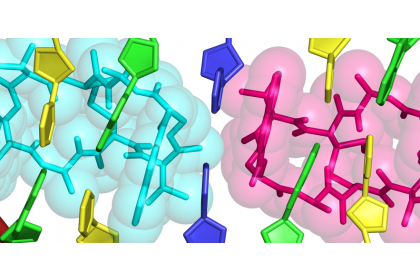Mismatch recognition by echinomycin may be harnessed for cancer detection
2018-06-15
興新聞張貼者
Unit秘書室
2,835
Source:2018-6-15/University of Cambridge/Department of Biochemistry/News
Michael Waring, and collaborators in Taiwan, have published a new paper in the journal Nucleic Acids Research on the recognition of T:T mismatches by echinomycin.
The human genome contains 3 billion base pairs. Whenever cells divide, there is a small risk of spurious errors arising in our DNA due to spontaneous mistakes by the replication mechanism, radiation damage, or exposure to mutagens. This can result in ‘mismatched’ base pairing, a potentially disastrous event that may develop into cancer if left unchecked. Fortunately, higher life-forms (including humans) have evolved mismatch repair (MMR) systems to cope with the problem, though a number of factors may cause MMR deficiencies and thus increase the risk of cancer in certain individuals. A high level of mismatched base pairs may indicate MMR deficiency. Molecular ligands capable of recognising mismatches therefore have potential application in the diagnosis of MMR-deficient cancers. Tight mismatch binders may even hinder the progression of cancer if applied at an early stage of the disease.
Professor Michael Waring from our Department has collaborated with the Hou Group at the National Chung Hsing University, Taiwan to show that echinomycin, a venerable compound from Streptomyces echinatus known to interfere with DNA replication and transcription, is able to bind selectively to T:T mismatched DNA in a cooperative fashion. Although the biological activity and anti-tumour capacity of echinomycin have been known for decades, this is the first observation of specific mismatch recognition by the antibiotic, raising the possibility of employing it to enable the detection of MMR-deficient cancers. The authors also showed that echinomycin was able to differentially inhibit proliferation of MMR-deficient cells, which could suggest a potential role for echinomycin in anti-tumour drug development. Since a large repertoire of compounds exists with similar activities to echinomycin, this study raises the possibility of harnessing novel activities of old compounds in the battle against cancer.
Michael Waring, and collaborators in Taiwan, have published a new paper in the journal Nucleic Acids Research on the recognition of T:T mismatches by echinomycin.
The human genome contains 3 billion base pairs. Whenever cells divide, there is a small risk of spurious errors arising in our DNA due to spontaneous mistakes by the replication mechanism, radiation damage, or exposure to mutagens. This can result in ‘mismatched’ base pairing, a potentially disastrous event that may develop into cancer if left unchecked. Fortunately, higher life-forms (including humans) have evolved mismatch repair (MMR) systems to cope with the problem, though a number of factors may cause MMR deficiencies and thus increase the risk of cancer in certain individuals. A high level of mismatched base pairs may indicate MMR deficiency. Molecular ligands capable of recognising mismatches therefore have potential application in the diagnosis of MMR-deficient cancers. Tight mismatch binders may even hinder the progression of cancer if applied at an early stage of the disease.
Professor Michael Waring from our Department has collaborated with the Hou Group at the National Chung Hsing University, Taiwan to show that echinomycin, a venerable compound from Streptomyces echinatus known to interfere with DNA replication and transcription, is able to bind selectively to T:T mismatched DNA in a cooperative fashion. Although the biological activity and anti-tumour capacity of echinomycin have been known for decades, this is the first observation of specific mismatch recognition by the antibiotic, raising the possibility of employing it to enable the detection of MMR-deficient cancers. The authors also showed that echinomycin was able to differentially inhibit proliferation of MMR-deficient cells, which could suggest a potential role for echinomycin in anti-tumour drug development. Since a large repertoire of compounds exists with similar activities to echinomycin, this study raises the possibility of harnessing novel activities of old compounds in the battle against cancer.


